BTCPay Server is a free, open-source, and self-hosted payment gateway that allows individuals and businesses to accept Bitcoin/altcoins payments online or in person without any additional fees.
Decentralized technologies changed how we handle financial transactions. In the last few years, there has been an interesting development regarding distributed point-of-sales systems. These are payment processing systems that operate on decentralized technology, typically using blockchain networks. Unlike traditional point-of-sales systems, that rely on centralized servers and intermediaries, distributed PoS systems enable direct transactions between customers and merchants.
One notable example of distributed point-of-sale is the BTCPayServer. It is an open-source software designed so merchants can determine their payment methods entirely. BTCPayServer can be customized according to the business strategy. Entrepreneurs have the possibility of hosting their platforms with full control over them. Companies that use BTCPayServer can accommodate more clients since the platform supports multiple cryptocurrencies.
This model reduces operational costs and protects customer data, no third-party individuals are involved. Online retailers and physical shops can benefit from distributed point-of-sales perks, making the payment process more efficient and cost-effective for the business and its customers.
Let's go through the specifications of BTCPayServer, analyzing its benefits and counterparts. After, let's check the possibility of distributed point-of-sales on the Decred decentralized social platform, Bison Relay.
How BTCPayServer Works?
BTCPay Server is a free, open-source, and self-hosted payment gateway that allows individuals and businesses to accept Bitcoin/altcoins payments online or in person without any additional fees.
The software functions as a self-hosted and automated invoicing system, making it easy to integrate into your business.
Video explaining how BTCPay Server works
Here's a simple explanation of how the BTCPay Server works:
When customers check out on your website or at your physical store, they receive an invoice generated by BTCPay Server. The customer then pays this invoice using their Bitcoin wallet. BTCPay Server tracks the payment through the blockchain and notifies you once the payment is confirmed. After receiving this confirmation, you can proceed to fulfill the order. BTCPay Server also handles payment refunds and bitcoin management, ensuring a smooth transaction process.
Key Features of BTCPay Server
- Direct, Peer-to-Peer Bitcoin Payments: Payments go directly from the customer to you.
- No Fees: There are no arbitrary or processing fees, only the usual Bitcoin network fee.
- No Middleman: BTCPay Server does not work intermediaries.
- No Know Your Customer Requirements: There's no need for customer identification.
- Non-Custodial: Users have total control over their private keys.
- Enhanced Privacy and Security: As a self-hosted solution, BTCPay Server offers higher levels of privacy and security.
To start using BTCPay Server, you can choose a self-hosted option, following a deployment method, or opt for third-party hosting if you prefer not to host it yourself.
Deployment methods
There are various deployment methods for using BTCPay Server, a free and open-source cryptocurrency payment processor. These methods cater to different needs and preferences, offering flexibility for users. The right solution depends on setup, maintenance, support, and cost.
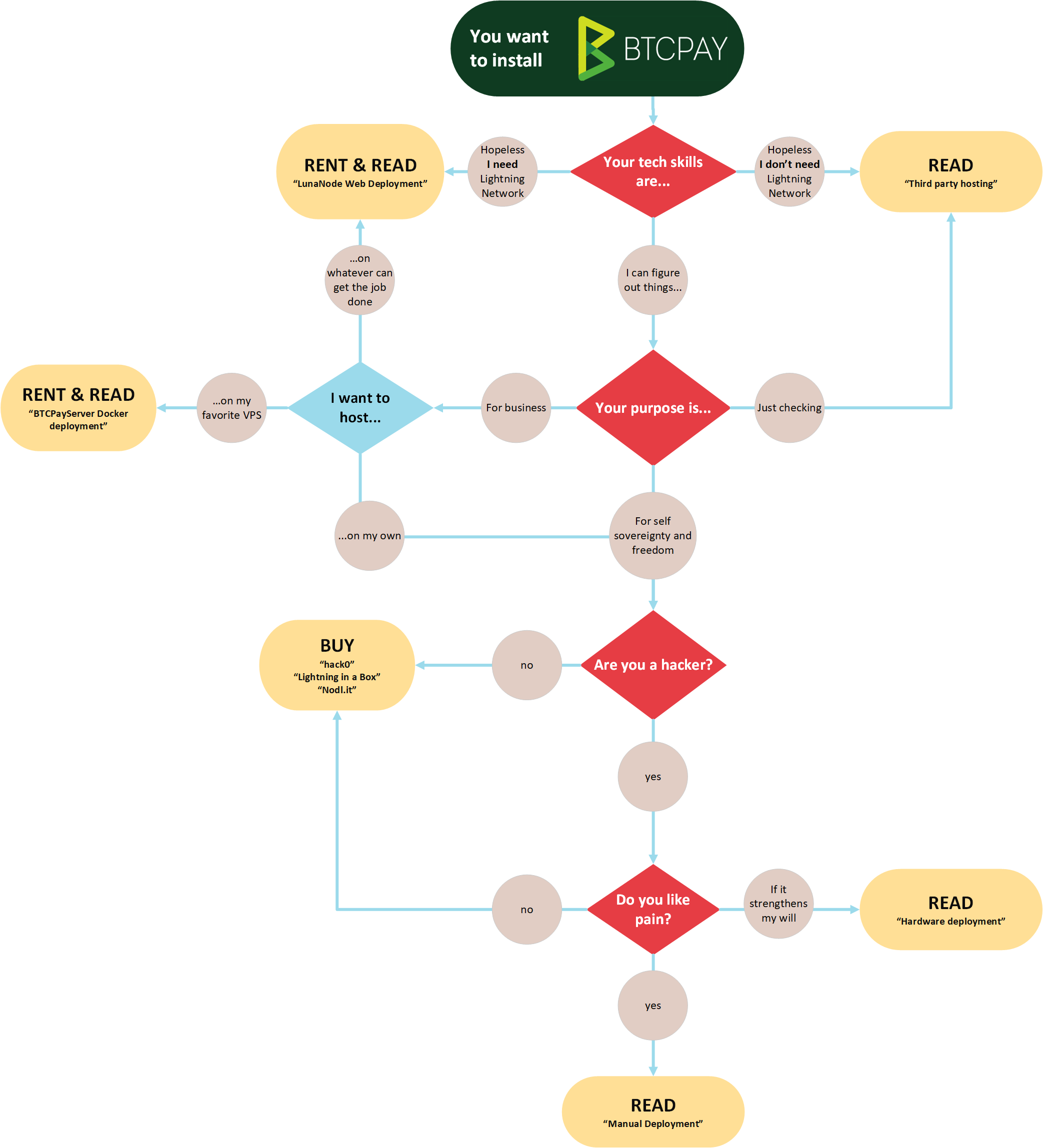
You can run BTCPay Server as a self-hosted solution on your server or use a third-party host. The self-hosted option allows you to connect multiple stores, utilize the Lightning Network, and even act as a payment processor for others. BTCPay is a non-custodial invoicing system, it does not involve third parties in fund management. Payments go directly to your wallet, and your private keys are never uploaded to the server. Even when using third-party BTCPay hosts, they do not control your funds; they only provide hosting for your BTCPay instance. Let's take a quick view of the main deployment methods:
Lunanode
Difficulty: Easy
Production/Dev: Production
All features available: Yes
Approx. cost per month: $10
Voltage-Cloud
Difficulty: Easy
Production/Dev: Production
All features available: No
Approx. cost per month: $10-$30
Clovyr
Difficulty: Easy
Production/Dev: Production
All features available: Yes
Approx. cost per month: $20
Third-Party Hosts
Difficulty: Easy
Production/Dev: Production
All features available: Host: Yes Hostee: No
Approx. cost per month: Free or Paid hosting, depending on provider
Hardware & Cloud As A Service
Difficulty: Easy to Moderate
Production/Dev: Production
All features available: Yes
Approx. cost per month: Varies on the provider Examples: embassyOS Lightning in a Box Nodl.it Nodl.cloud Voltage.cloud
Virtual Private Server
Difficulty: Moderate to Hard
Production/Dev: Production
All features available: Yes
Approx. cost per month: $10-$70 depending on provider
Examples: LunaNode (OpenVZ not supported) Microsoft Azure Digital Ocean Google Cloud Other VPS (minimal requirements)
Manual Deployment
Difficulty: Very hard
Production/Dev: Development
All features available: Yes
Approx. cost per month: Components + Electricity
Methods: Install From Command Line Build Without Docker Image
Hardware Build
Difficulty: Hard
Production/Dev: Development
All features available: Yes
Approx. cost per month: Components + Electricity
Examples: Raspberry Pi 4 Hack0 LightningInABox
Architecture of BTCPayServer
BTCPayServer combines different Bitcoin-related components into a coherent user experience for managing a payment processor. The following image shows the architecture and data flow of a BTCPay Server setup, showing the relationships between its components:
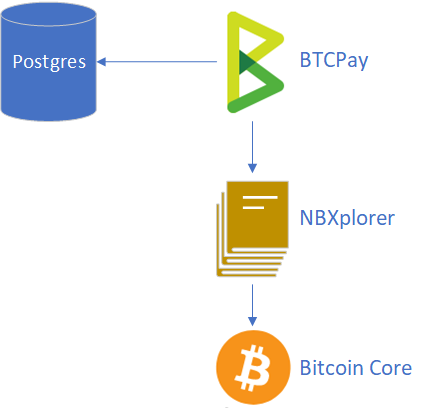
- Postgres: This is the database used by BTCPay Server to store data. It keeps information such as transaction records, user details, and other necessary data for the operation of the BTCPay Server.
- BTCPay Server: The main application, which acts as the interface for users to manage cryptocurrency payments. It interacts with the Postgres database to retrieve and store data. BTCPay Server handles invoicing, payment processing, and various administrative tasks.
- NBXplorer: A component that the BTCPay Server uses to interact with the blockchain. NBXplorer indexes the blockchain data and provides an efficient way to query the blockchain for specific information. It helps the BTCPay Server track transactions, generate addresses, and monitor payment statuses.
- Bitcoin Core: The full node implementation of the Bitcoin protocol. Interacts directly with the Bitcoin blockchain, maintaining a complete copy of the blockchain and validating transactions. NBXplorer relies on Bitcoin Core to get the raw blockchain data to index and serve queries.
Data Flow:
- BTCPay Server retrieves and stores data in the Postgres database.
- BTCPay Server uses NBXplorer to query and track blockchain transactions.
- NBXplorer communicates with Bitcoin Core to get the necessary blockchain data.
In summary, Bitcoin Core provides the raw blockchain data, NBXplorer indexes the specific data and makes it accessible, BTCPay Server processes payments and user interactions, and Postgres stores the operational data.
Implementing distributed Point-of-sales on Bison Relay
Bison Relay is a decentralized communication tool developed by the Decred team, designed to facilitate secure and private messaging. It operates using the Decred Lightning Network (LN) to ensure that every message sent is encrypted, minimizing metadata exposure and requiring a micropayment via the LN for each transaction. This setup ensures that messages are individually handled and paid for, enhancing privacy and security.

The Bison Relay structure eliminates centralized control over communications. No single entity can check or control user data, this means a high level of sovereignty and privacy for users. Bison Relay was developed under the Decred ethos to enhance user autonomy and anonymity through a decentralized network. It essentially combines secure communications with cryptocurrency payments.
More than just a communication tool, Bison Relay is a versatile software where different applications can be implemented. The Lightning network's ability to handle rapid and low-cost micropayments using DCR creates the perfect environment for distributed Points-of-sales. Imagine deploying your shop on Bison Relay, where you can sell products and also announce them on different spots, such as chatrooms or your feed.
Check out Bison Relay interface
How Bison Relay Bridges Distributed PoS Systems:
Micropayments and Transaction Efficiency: Bison Relay uses the Lightning Network to handle rapid and low-cost micropayments, enabling efficient processing of numerous transactions, ideal for small, frequent payments in retail environments.
Enhanced Security and Privacy: Each transaction is encrypted and metadata is minimized, protecting customer payment information and reducing the risk of data breaches.
Decentralization: Bison Relay operates without centralized control, allowing businesses to maintain independence from traditional financial institutions, reducing costs, and mitigating risks associated with central points of failure.
Scalability: The Lightning Network ensures the system can handle high transaction volumes, essential during peak times, keeping transactions fast and cost-effective.
Real-World Application: A retail store using Bison Relay processes transactions quickly and securely, maintains customer privacy, operates independently of traditional banks, reduces overhead costs, and integrates with other LN-based services like inventory management.
Moving Forward
The introduction of decentralized technologies into shopping through platforms like BTCPayServer represents a huge advancement in the digital economy. Have you ever used a distributed point-of-sale as a host or client? Enjoyed your experience? Tell us more in the comments section below!


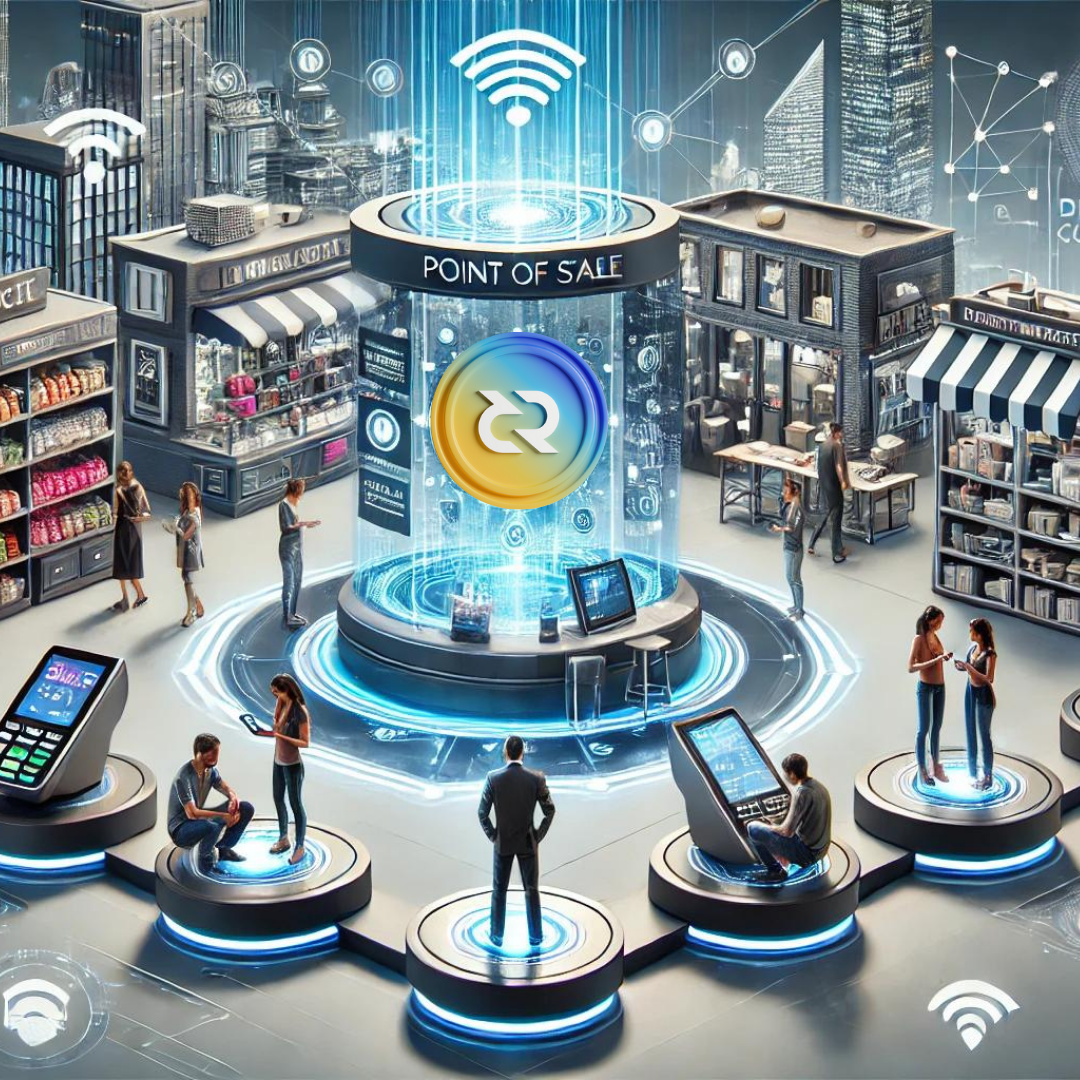
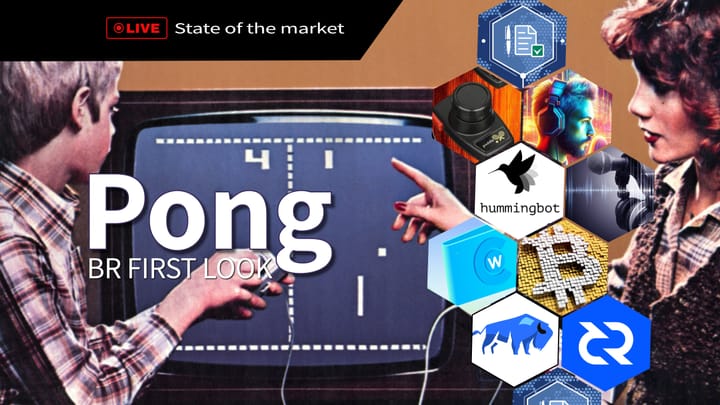
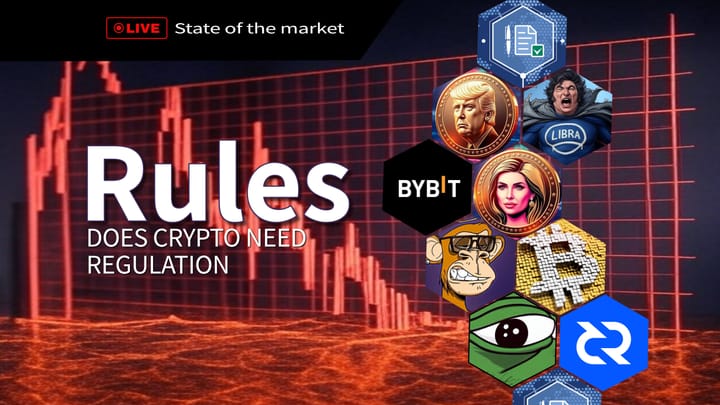
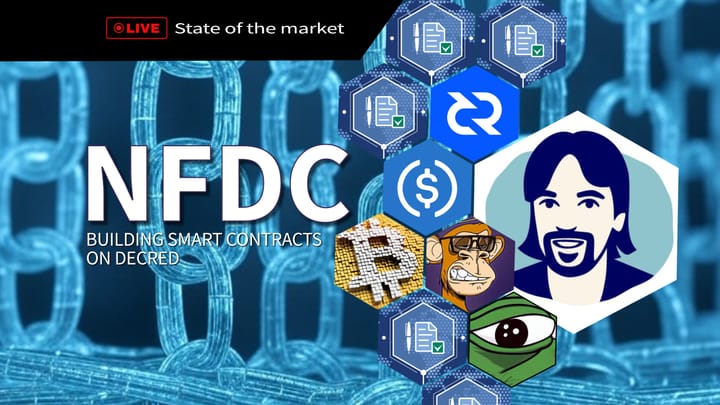
Comments ()